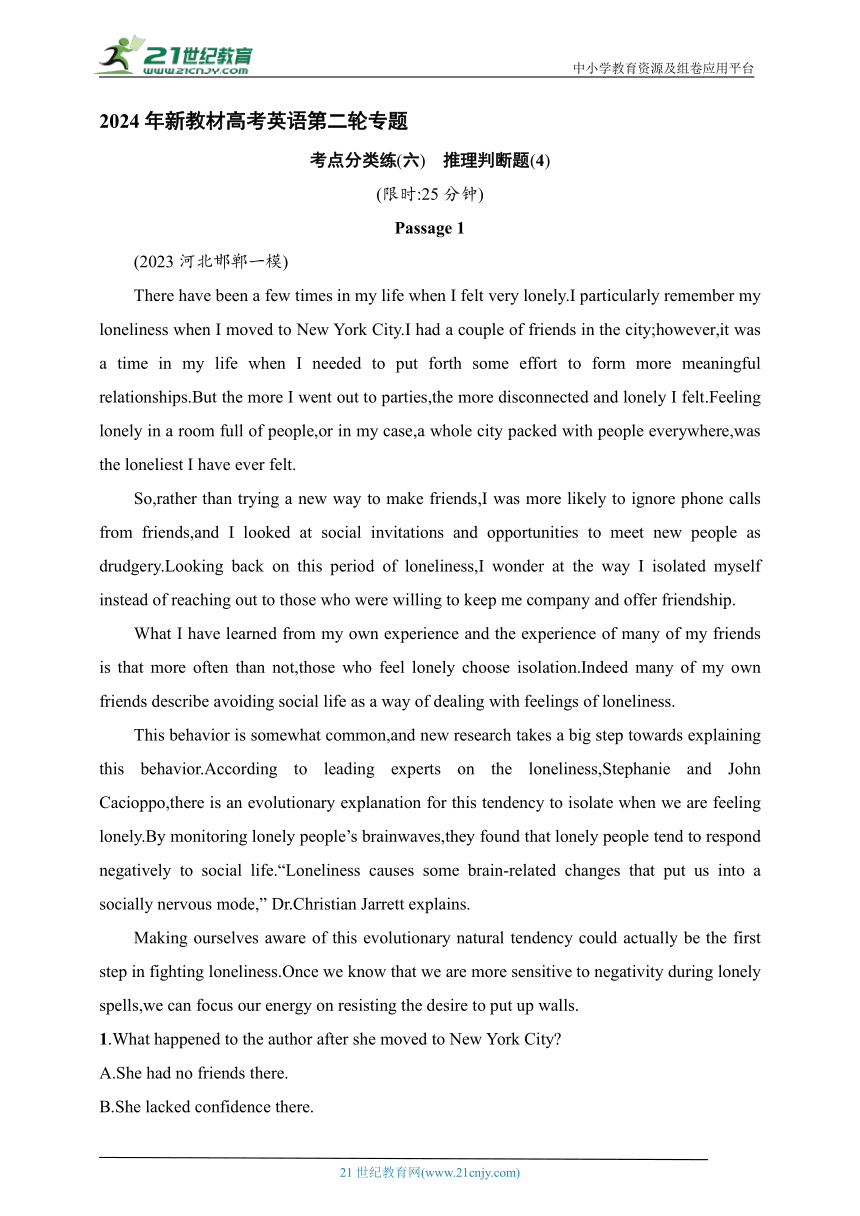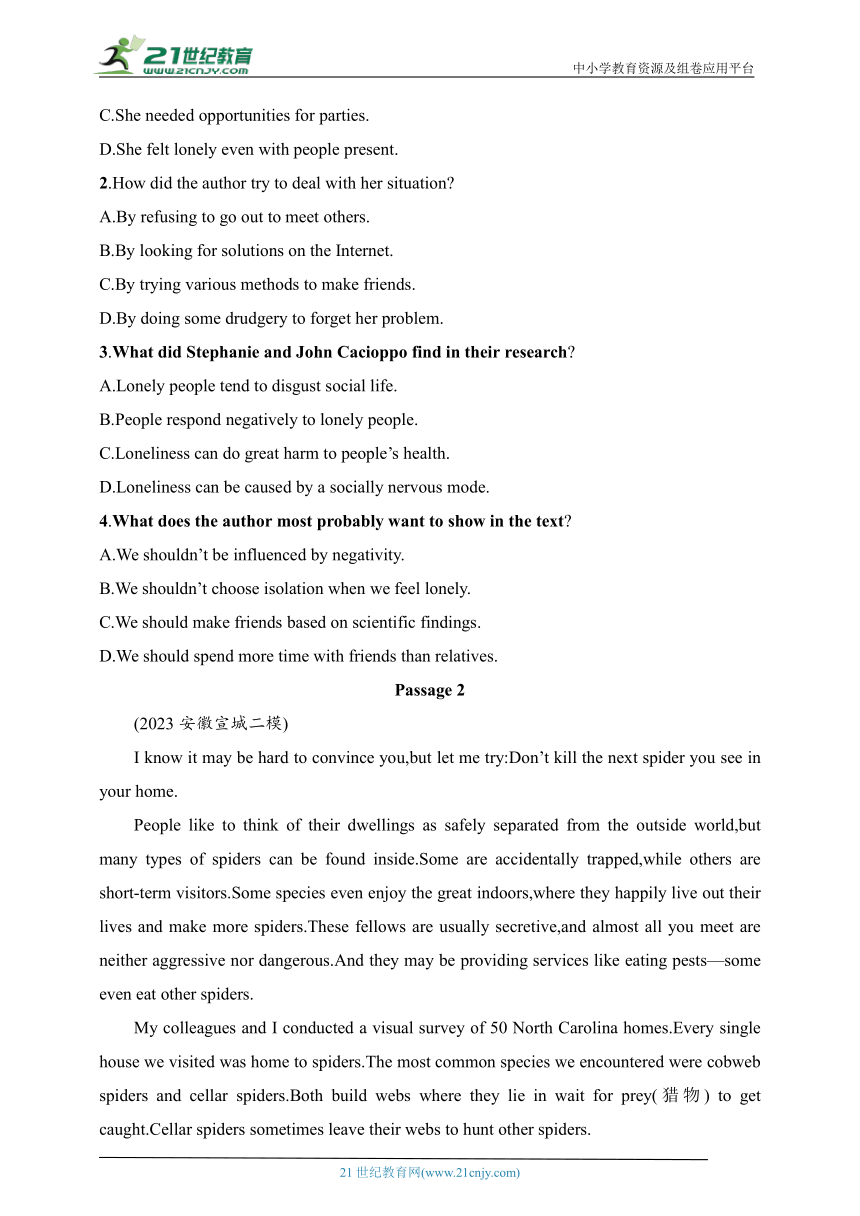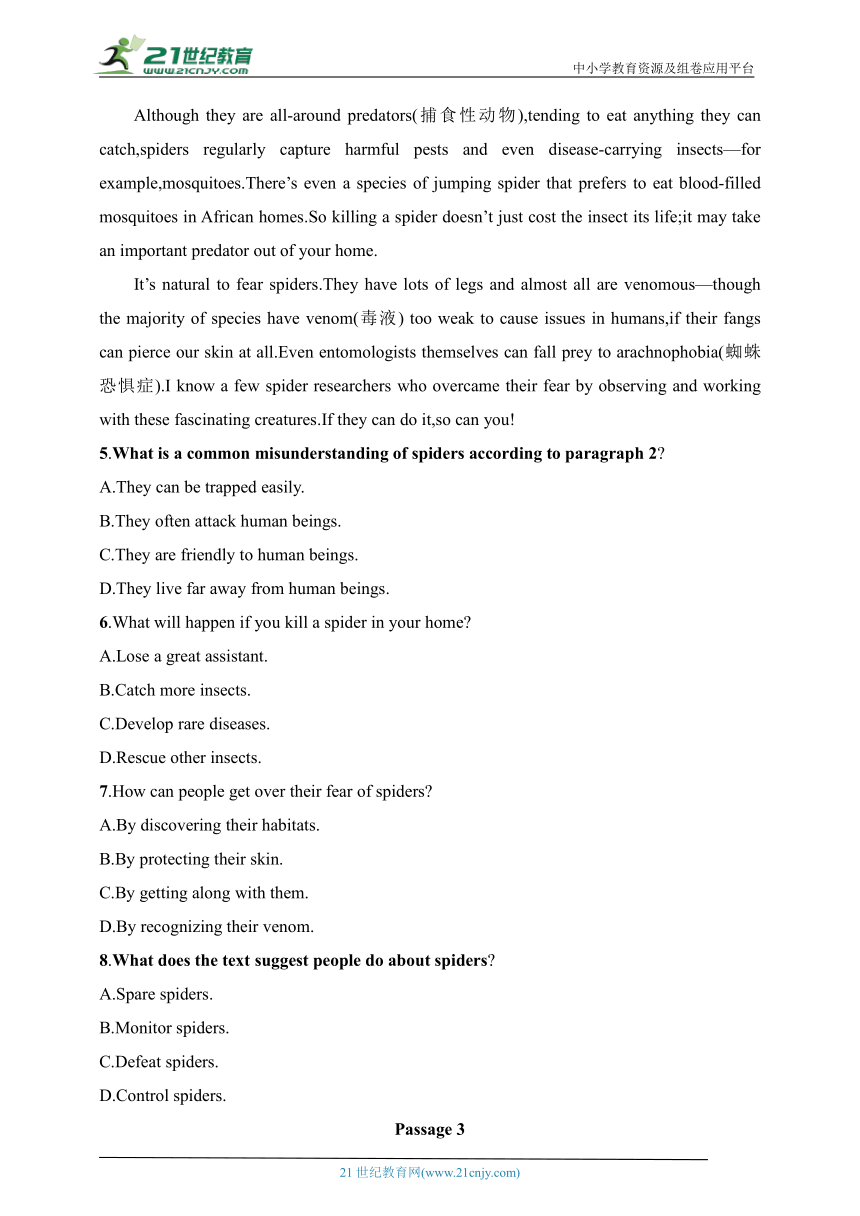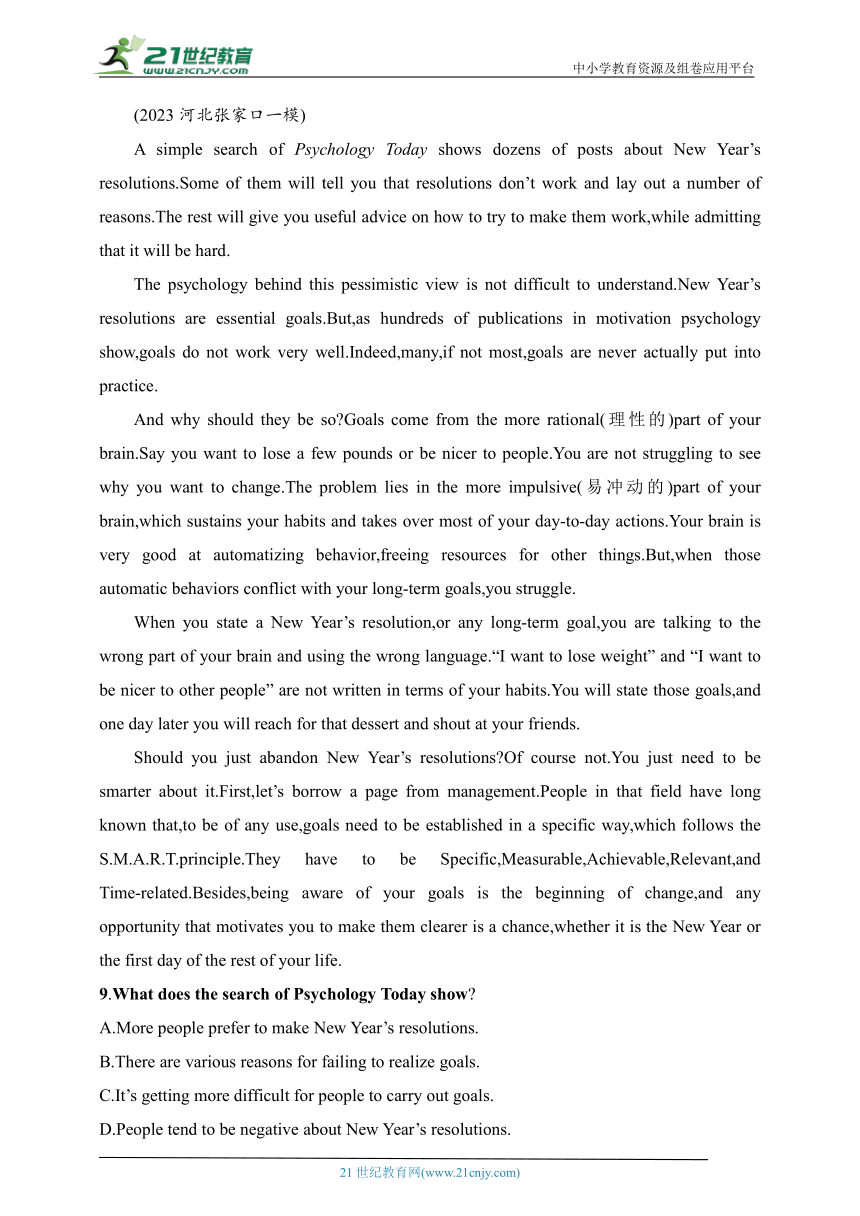2024年新教材高考英语第二轮专题练习--阅读理解 考点分类练6 推理判断题(4)(答案与解析)
文档属性
| 名称 | 2024年新教材高考英语第二轮专题练习--阅读理解 考点分类练6 推理判断题(4)(答案与解析) |  | |
| 格式 | docx | ||
| 文件大小 | 1.0MB | ||
| 资源类型 | 试卷 | ||
| 版本资源 | 通用版 | ||
| 科目 | 英语 | ||
| 更新时间 | 2023-10-25 15:47:03 | ||
图片预览




文档简介
中小学教育资源及组卷应用平台
2024年新教材高考英语第二轮专题
考点分类练(六) 推理判断题(4)
(限时:25分钟)
Passage 1
(2023河北邯郸一模)
There have been a few times in my life when I felt very lonely.I particularly remember my loneliness when I moved to New York City.I had a couple of friends in the city;however,it was a time in my life when I needed to put forth some effort to form more meaningful relationships.But the more I went out to parties,the more disconnected and lonely I felt.Feeling lonely in a room full of people,or in my case,a whole city packed with people everywhere,was the loneliest I have ever felt.
So,rather than trying a new way to make friends,I was more likely to ignore phone calls from friends,and I looked at social invitations and opportunities to meet new people as drudgery.Looking back on this period of loneliness,I wonder at the way I isolated myself instead of reaching out to those who were willing to keep me company and offer friendship.
What I have learned from my own experience and the experience of many of my friends is that more often than not,those who feel lonely choose isolation.Indeed many of my own friends describe avoiding social life as a way of dealing with feelings of loneliness.
This behavior is somewhat common,and new research takes a big step towards explaining this behavior.According to leading experts on the loneliness,Stephanie and John Cacioppo,there is an evolutionary explanation for this tendency to isolate when we are feeling lonely.By monitoring lonely people’s brainwaves,they found that lonely people tend to respond negatively to social life.“Loneliness causes some brain-related changes that put us into a socially nervous mode,” Dr.Christian Jarrett explains.
Making ourselves aware of this evolutionary natural tendency could actually be the first step in fighting loneliness.Once we know that we are more sensitive to negativity during lonely spells,we can focus our energy on resisting the desire to put up walls.
1.What happened to the author after she moved to New York City
A.She had no friends there.
B.She lacked confidence there.
C.She needed opportunities for parties.
D.She felt lonely even with people present.
2.How did the author try to deal with her situation
A.By refusing to go out to meet others.
B.By looking for solutions on the Internet.
C.By trying various methods to make friends.
D.By doing some drudgery to forget her problem.
3.What did Stephanie and John Cacioppo find in their research
A.Lonely people tend to disgust social life.
B.People respond negatively to lonely people.
C.Loneliness can do great harm to people’s health.
D.Loneliness can be caused by a socially nervous mode.
4.What does the author most probably want to show in the text
A.We shouldn’t be influenced by negativity.
B.We shouldn’t choose isolation when we feel lonely.
C.We should make friends based on scientific findings.
D.We should spend more time with friends than relatives.
Passage 2
(2023安徽宣城二模)
I know it may be hard to convince you,but let me try:Don’t kill the next spider you see in your home.
People like to think of their dwellings as safely separated from the outside world,but many types of spiders can be found inside.Some are accidentally trapped,while others are short-term visitors.Some species even enjoy the great indoors,where they happily live out their lives and make more spiders.These fellows are usually secretive,and almost all you meet are neither aggressive nor dangerous.And they may be providing services like eating pests—some even eat other spiders.
My colleagues and I conducted a visual survey of 50 North Carolina homes.Every single house we visited was home to spiders.The most common species we encountered were cobweb spiders and cellar spiders.Both build webs where they lie in wait for prey(猎物) to get caught.Cellar spiders sometimes leave their webs to hunt other spiders.
Although they are all-around predators(捕食性动物),tending to eat anything they can catch,spiders regularly capture harmful pests and even disease-carrying insects—for example,mosquitoes.There’s even a species of jumping spider that prefers to eat blood-filled mosquitoes in African homes.So killing a spider doesn’t just cost the insect its life;it may take an important predator out of your home.
It’s natural to fear spiders.They have lots of legs and almost all are venomous—though the majority of species have venom(毒液) too weak to cause issues in humans,if their fangs can pierce our skin at all.Even entomologists themselves can fall prey to arachnophobia(蜘蛛恐惧症).I know a few spider researchers who overcame their fear by observing and working with these fascinating creatures.If they can do it,so can you!
5.What is a common misunderstanding of spiders according to paragraph 2
A.They can be trapped easily.
B.They often attack human beings.
C.They are friendly to human beings.
D.They live far away from human beings.
6.What will happen if you kill a spider in your home
A.Lose a great assistant.
B.Catch more insects.
C.Develop rare diseases.
D.Rescue other insects.
7.How can people get over their fear of spiders
A.By discovering their habitats.
B.By protecting their skin.
C.By getting along with them.
D.By recognizing their venom.
8.What does the text suggest people do about spiders
A.Spare spiders.
B.Monitor spiders.
C.Defeat spiders.
D.Control spiders.
Passage 3
(2023河北张家口一模)
A simple search of Psychology Today shows dozens of posts about New Year’s resolutions.Some of them will tell you that resolutions don’t work and lay out a number of reasons.The rest will give you useful advice on how to try to make them work,while admitting that it will be hard.
The psychology behind this pessimistic view is not difficult to understand.New Year’s resolutions are essential goals.But,as hundreds of publications in motivation psychology show,goals do not work very well.Indeed,many,if not most,goals are never actually put into practice.
And why should they be so Goals come from the more rational(理性的)part of your brain.Say you want to lose a few pounds or be nicer to people.You are not struggling to see why you want to change.The problem lies in the more impulsive(易冲动的)part of your brain,which sustains your habits and takes over most of your day-to-day actions.Your brain is very good at automatizing behavior,freeing resources for other things.But,when those automatic behaviors conflict with your long-term goals,you struggle.
When you state a New Year’s resolution,or any long-term goal,you are talking to the wrong part of your brain and using the wrong language.“I want to lose weight” and “I want to be nicer to other people” are not written in terms of your habits.You will state those goals,and one day later you will reach for that dessert and shout at your friends.
Should you just abandon New Year’s resolutions Of course not.You just need to be smarter about it.First,let’s borrow a page from management.People in that field have long known that,to be of any use,goals need to be established in a specific way,which follows the S.M.A.R.T.principle.They have to be Specific,Measurable,Achievable,Relevant,and Time-related.Besides,being aware of your goals is the beginning of change,and any opportunity that motivates you to make them clearer is a chance,whether it is the New Year or the first day of the rest of your life.
9.What does the search of Psychology Today show
A.More people prefer to make New Year’s resolutions.
B.There are various reasons for failing to realize goals.
C.It’s getting more difficult for people to carry out goals.
D.People tend to be negative about New Year’s resolutions.
10.What determines our habits according to the text
A.Our long-term goals.
B.Our rational thoughts.
C.Our impulsive thoughts.
D.Our resource distribution.
11.What’s the author’s attitude to making New Year’s resolutions
A.Unclear. B.Supportive.
C.Intolerant. D.Pessimistic.
12.Which of the following is a suitable title for the text
A.The Psychology Behind New Year’s Resolutions
B.How to Make Your New Year’s Resolutions Work
C.How Do New Year’s Resolutions Influence Our Life
D.The Significance of Making New Year’s Resolutions
答案:
考点分类练(六) 推理判断题(4)
Passage 1
[语篇解读]本文是一篇说明文。文章主要说明了尽管我们在感到孤独的时候会对社交活动产生抵触,但应该尽量避免这样做。
1.D 细节理解题。根据第一段最后一句“Feeling lonely in a room full of people,or in my case,a whole city packed with people everywhere,was the loneliest I have ever felt.”可知,作者发现自己跟很多人在一起时仍然感到孤独。故选D项。
2.A 细节理解题。根据第二段可知,作者选择不外出和别人进行社交活动。
3.A 推理判断题。根据第四段第三、四句“By monitoring lonely people’s brainwaves,they found that lonely people tend to respond negatively to social life.‘Loneliness causes some brain-related changes that put us into a socially nervous mode,’ Dr.Christian Jarrett explains.”可知,他们发现感到孤独的人倾向于厌恶社交活动。
4.B 推理判断题。根据最后一段可知,当我们感到孤单时,我们也不应该拒绝社交活动。
Passage 2
[语篇解读]本文是一篇说明文。文章主要通过介绍蜘蛛的生活习性以及给人类生活带来的好处,劝导人们不要杀害蜘蛛。
5.D 推理判断题。根据第二段中的“People like to think of their dwellings as safely separated from the outside world,but many types of spiders can be found inside.”可知,人们觉得自己生活在一个与外界安全隔离的地方,但是蜘蛛却可以在室内被发现,由此可知,人们常见的误解是蜘蛛住得离人类很远。
6.A 细节理解题。根据倒数第二段中的“So killing a spider doesn’t just cost the insect its life;it may take an important predator out of your home.”可知,杀死蜘蛛意味着把重要的捕食者带走,也就是说,你失去了一个了不起的助手。
7.C 细节理解题。根据最后一段中的“I know a few spider researchers who overcame their fear by observing and working with these fascinating creatures.If they can do it,so can you!”可知,蜘蛛研究员是通过观察和研究起这些小生物来克服对蜘蛛的恐惧的,而且作者认为他们能做到的,你也可以做到,由此可知,人们可以通过与蜘蛛相处来克服对蜘蛛的恐惧。
8.A 推理判断题。根据第一段以及下文对蜘蛛生活习性和对人类的好处的介绍可知,作者是要通过介绍蜘蛛对人类的好处而尽力地劝说人们不要伤害蜘蛛,所以本文建议人们要放过蜘蛛。
Passage 3
[语篇解读]本文是一篇说明文。文章主要介绍了为什么新年决心不起作用,以及如何更好地制定新年目标。
9.D 推理判断题。根据第一段可知,《今日心理学》的调查显示了人们往往对新年计划持消极态度。
10.C 细节理解题。根据第三段中“The problem lies in the more impulsive part of your brain,which sustains your habits and takes over most of your day-to-day actions.”可知,我们冲动的想法决定了我们的习惯。
11.B 推理判断题。根据最后一段中“Should you just abandon New Year’s resolutions Of course not.You just need to be smarter about it.”可推知,作者对制定新年计划的态度是支持的。
12.A 主旨大意题。根据第二段可知,本文分析了新年决心背后的心理是怎样的,下文解释了为什么会这样,以及最后给出了解决方法,所以A项“The Psychology Behind New Year’s Resolutions”是本文最好的标题。
词汇积累:
1.(Passage 1)put forth发挥(力量、精力等)
2.(Passage 1)look back on回顾
3.(Passage 1)keep pany陪伴某人
4.(Passage 1)more often than not通常,多半
5.(Passage 1)tendency n.趋势,趋向
6.(Passage 1)be sensitive to对……敏感
7.(Passage 1)resist vt.抵制
8.(Passage 2)convince v.使信服
9.(Passage 2)accidentally adv.意外地,偶然地
10.(Passage 2)aggressive adj.好斗的,挑衅的
11.(Passage 3)lay out摆出,展开
12.(Passage 3)take over接管
13.(Passage 3)essentially adv.本质上
熟词生义:
(Passage 3)state vt.陈述,说明
长难句分析:
(Passage 2)Although they are all-around predators,tending to eat anything they can catch,spiders regularly capture harmful pests and even disease-carrying insects—for example,mosquitoes.
分析:本句为复合句。Although they are all-around predators为Although引导的让步状语从句;they can catch为定语从句,修饰先行词anything。
句意:虽然它们是全能的捕食者,倾向于吃掉它们能抓到的任何东西,但蜘蛛经常捕捉有害的害虫,甚至是携带疾病的昆虫,比如蚊子。
21世纪教育网 www.21cnjy.com 精品试卷·第 2 页 (共 2 页)
21世纪教育网(www.21cnjy.com)
2024年新教材高考英语第二轮专题
考点分类练(六) 推理判断题(4)
(限时:25分钟)
Passage 1
(2023河北邯郸一模)
There have been a few times in my life when I felt very lonely.I particularly remember my loneliness when I moved to New York City.I had a couple of friends in the city;however,it was a time in my life when I needed to put forth some effort to form more meaningful relationships.But the more I went out to parties,the more disconnected and lonely I felt.Feeling lonely in a room full of people,or in my case,a whole city packed with people everywhere,was the loneliest I have ever felt.
So,rather than trying a new way to make friends,I was more likely to ignore phone calls from friends,and I looked at social invitations and opportunities to meet new people as drudgery.Looking back on this period of loneliness,I wonder at the way I isolated myself instead of reaching out to those who were willing to keep me company and offer friendship.
What I have learned from my own experience and the experience of many of my friends is that more often than not,those who feel lonely choose isolation.Indeed many of my own friends describe avoiding social life as a way of dealing with feelings of loneliness.
This behavior is somewhat common,and new research takes a big step towards explaining this behavior.According to leading experts on the loneliness,Stephanie and John Cacioppo,there is an evolutionary explanation for this tendency to isolate when we are feeling lonely.By monitoring lonely people’s brainwaves,they found that lonely people tend to respond negatively to social life.“Loneliness causes some brain-related changes that put us into a socially nervous mode,” Dr.Christian Jarrett explains.
Making ourselves aware of this evolutionary natural tendency could actually be the first step in fighting loneliness.Once we know that we are more sensitive to negativity during lonely spells,we can focus our energy on resisting the desire to put up walls.
1.What happened to the author after she moved to New York City
A.She had no friends there.
B.She lacked confidence there.
C.She needed opportunities for parties.
D.She felt lonely even with people present.
2.How did the author try to deal with her situation
A.By refusing to go out to meet others.
B.By looking for solutions on the Internet.
C.By trying various methods to make friends.
D.By doing some drudgery to forget her problem.
3.What did Stephanie and John Cacioppo find in their research
A.Lonely people tend to disgust social life.
B.People respond negatively to lonely people.
C.Loneliness can do great harm to people’s health.
D.Loneliness can be caused by a socially nervous mode.
4.What does the author most probably want to show in the text
A.We shouldn’t be influenced by negativity.
B.We shouldn’t choose isolation when we feel lonely.
C.We should make friends based on scientific findings.
D.We should spend more time with friends than relatives.
Passage 2
(2023安徽宣城二模)
I know it may be hard to convince you,but let me try:Don’t kill the next spider you see in your home.
People like to think of their dwellings as safely separated from the outside world,but many types of spiders can be found inside.Some are accidentally trapped,while others are short-term visitors.Some species even enjoy the great indoors,where they happily live out their lives and make more spiders.These fellows are usually secretive,and almost all you meet are neither aggressive nor dangerous.And they may be providing services like eating pests—some even eat other spiders.
My colleagues and I conducted a visual survey of 50 North Carolina homes.Every single house we visited was home to spiders.The most common species we encountered were cobweb spiders and cellar spiders.Both build webs where they lie in wait for prey(猎物) to get caught.Cellar spiders sometimes leave their webs to hunt other spiders.
Although they are all-around predators(捕食性动物),tending to eat anything they can catch,spiders regularly capture harmful pests and even disease-carrying insects—for example,mosquitoes.There’s even a species of jumping spider that prefers to eat blood-filled mosquitoes in African homes.So killing a spider doesn’t just cost the insect its life;it may take an important predator out of your home.
It’s natural to fear spiders.They have lots of legs and almost all are venomous—though the majority of species have venom(毒液) too weak to cause issues in humans,if their fangs can pierce our skin at all.Even entomologists themselves can fall prey to arachnophobia(蜘蛛恐惧症).I know a few spider researchers who overcame their fear by observing and working with these fascinating creatures.If they can do it,so can you!
5.What is a common misunderstanding of spiders according to paragraph 2
A.They can be trapped easily.
B.They often attack human beings.
C.They are friendly to human beings.
D.They live far away from human beings.
6.What will happen if you kill a spider in your home
A.Lose a great assistant.
B.Catch more insects.
C.Develop rare diseases.
D.Rescue other insects.
7.How can people get over their fear of spiders
A.By discovering their habitats.
B.By protecting their skin.
C.By getting along with them.
D.By recognizing their venom.
8.What does the text suggest people do about spiders
A.Spare spiders.
B.Monitor spiders.
C.Defeat spiders.
D.Control spiders.
Passage 3
(2023河北张家口一模)
A simple search of Psychology Today shows dozens of posts about New Year’s resolutions.Some of them will tell you that resolutions don’t work and lay out a number of reasons.The rest will give you useful advice on how to try to make them work,while admitting that it will be hard.
The psychology behind this pessimistic view is not difficult to understand.New Year’s resolutions are essential goals.But,as hundreds of publications in motivation psychology show,goals do not work very well.Indeed,many,if not most,goals are never actually put into practice.
And why should they be so Goals come from the more rational(理性的)part of your brain.Say you want to lose a few pounds or be nicer to people.You are not struggling to see why you want to change.The problem lies in the more impulsive(易冲动的)part of your brain,which sustains your habits and takes over most of your day-to-day actions.Your brain is very good at automatizing behavior,freeing resources for other things.But,when those automatic behaviors conflict with your long-term goals,you struggle.
When you state a New Year’s resolution,or any long-term goal,you are talking to the wrong part of your brain and using the wrong language.“I want to lose weight” and “I want to be nicer to other people” are not written in terms of your habits.You will state those goals,and one day later you will reach for that dessert and shout at your friends.
Should you just abandon New Year’s resolutions Of course not.You just need to be smarter about it.First,let’s borrow a page from management.People in that field have long known that,to be of any use,goals need to be established in a specific way,which follows the S.M.A.R.T.principle.They have to be Specific,Measurable,Achievable,Relevant,and Time-related.Besides,being aware of your goals is the beginning of change,and any opportunity that motivates you to make them clearer is a chance,whether it is the New Year or the first day of the rest of your life.
9.What does the search of Psychology Today show
A.More people prefer to make New Year’s resolutions.
B.There are various reasons for failing to realize goals.
C.It’s getting more difficult for people to carry out goals.
D.People tend to be negative about New Year’s resolutions.
10.What determines our habits according to the text
A.Our long-term goals.
B.Our rational thoughts.
C.Our impulsive thoughts.
D.Our resource distribution.
11.What’s the author’s attitude to making New Year’s resolutions
A.Unclear. B.Supportive.
C.Intolerant. D.Pessimistic.
12.Which of the following is a suitable title for the text
A.The Psychology Behind New Year’s Resolutions
B.How to Make Your New Year’s Resolutions Work
C.How Do New Year’s Resolutions Influence Our Life
D.The Significance of Making New Year’s Resolutions
答案:
考点分类练(六) 推理判断题(4)
Passage 1
[语篇解读]本文是一篇说明文。文章主要说明了尽管我们在感到孤独的时候会对社交活动产生抵触,但应该尽量避免这样做。
1.D 细节理解题。根据第一段最后一句“Feeling lonely in a room full of people,or in my case,a whole city packed with people everywhere,was the loneliest I have ever felt.”可知,作者发现自己跟很多人在一起时仍然感到孤独。故选D项。
2.A 细节理解题。根据第二段可知,作者选择不外出和别人进行社交活动。
3.A 推理判断题。根据第四段第三、四句“By monitoring lonely people’s brainwaves,they found that lonely people tend to respond negatively to social life.‘Loneliness causes some brain-related changes that put us into a socially nervous mode,’ Dr.Christian Jarrett explains.”可知,他们发现感到孤独的人倾向于厌恶社交活动。
4.B 推理判断题。根据最后一段可知,当我们感到孤单时,我们也不应该拒绝社交活动。
Passage 2
[语篇解读]本文是一篇说明文。文章主要通过介绍蜘蛛的生活习性以及给人类生活带来的好处,劝导人们不要杀害蜘蛛。
5.D 推理判断题。根据第二段中的“People like to think of their dwellings as safely separated from the outside world,but many types of spiders can be found inside.”可知,人们觉得自己生活在一个与外界安全隔离的地方,但是蜘蛛却可以在室内被发现,由此可知,人们常见的误解是蜘蛛住得离人类很远。
6.A 细节理解题。根据倒数第二段中的“So killing a spider doesn’t just cost the insect its life;it may take an important predator out of your home.”可知,杀死蜘蛛意味着把重要的捕食者带走,也就是说,你失去了一个了不起的助手。
7.C 细节理解题。根据最后一段中的“I know a few spider researchers who overcame their fear by observing and working with these fascinating creatures.If they can do it,so can you!”可知,蜘蛛研究员是通过观察和研究起这些小生物来克服对蜘蛛的恐惧的,而且作者认为他们能做到的,你也可以做到,由此可知,人们可以通过与蜘蛛相处来克服对蜘蛛的恐惧。
8.A 推理判断题。根据第一段以及下文对蜘蛛生活习性和对人类的好处的介绍可知,作者是要通过介绍蜘蛛对人类的好处而尽力地劝说人们不要伤害蜘蛛,所以本文建议人们要放过蜘蛛。
Passage 3
[语篇解读]本文是一篇说明文。文章主要介绍了为什么新年决心不起作用,以及如何更好地制定新年目标。
9.D 推理判断题。根据第一段可知,《今日心理学》的调查显示了人们往往对新年计划持消极态度。
10.C 细节理解题。根据第三段中“The problem lies in the more impulsive part of your brain,which sustains your habits and takes over most of your day-to-day actions.”可知,我们冲动的想法决定了我们的习惯。
11.B 推理判断题。根据最后一段中“Should you just abandon New Year’s resolutions Of course not.You just need to be smarter about it.”可推知,作者对制定新年计划的态度是支持的。
12.A 主旨大意题。根据第二段可知,本文分析了新年决心背后的心理是怎样的,下文解释了为什么会这样,以及最后给出了解决方法,所以A项“The Psychology Behind New Year’s Resolutions”是本文最好的标题。
词汇积累:
1.(Passage 1)put forth发挥(力量、精力等)
2.(Passage 1)look back on回顾
3.(Passage 1)keep pany陪伴某人
4.(Passage 1)more often than not通常,多半
5.(Passage 1)tendency n.趋势,趋向
6.(Passage 1)be sensitive to对……敏感
7.(Passage 1)resist vt.抵制
8.(Passage 2)convince v.使信服
9.(Passage 2)accidentally adv.意外地,偶然地
10.(Passage 2)aggressive adj.好斗的,挑衅的
11.(Passage 3)lay out摆出,展开
12.(Passage 3)take over接管
13.(Passage 3)essentially adv.本质上
熟词生义:
(Passage 3)state vt.陈述,说明
长难句分析:
(Passage 2)Although they are all-around predators,tending to eat anything they can catch,spiders regularly capture harmful pests and even disease-carrying insects—for example,mosquitoes.
分析:本句为复合句。Although they are all-around predators为Although引导的让步状语从句;they can catch为定语从句,修饰先行词anything。
句意:虽然它们是全能的捕食者,倾向于吃掉它们能抓到的任何东西,但蜘蛛经常捕捉有害的害虫,甚至是携带疾病的昆虫,比如蚊子。
21世纪教育网 www.21cnjy.com 精品试卷·第 2 页 (共 2 页)
21世纪教育网(www.21cnjy.com)
